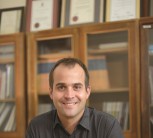A two-minute smartphone test can identify hearing and vision problems before children even start school according to new research published in the prestigious Bulletin of the World Health Organisation.
The University of Pretoria’s (UP) Professor De Wet Swanepoel, lead investigator on this project, says “95% of young children don’t get the chance to have these senses checked before entering school. Children who don't hear or see well can't learn well. As a result these kids can't perform in a school environment.”
Screening is usually unavailable because equipment is so expensive and there is a shortage of trained personnel, such as audiologists.
The mobile health technology used for the community screening project in the Western Cape is provided by the hearX Group, a digital health start-up from South Africa. The hearScreen app, initially developed at UP, provides a quick reliable hearing check that can be operated by community health workers. Vision is checked using the Peek Acuity app provided by the UK-based partner Peek Vision.
Hearing and vision impairments are the most common developmental disabilities in children younger than five years, with more than 40 million children affected globally. Healthy hearing and vision during early childhood is essential for optimal language, speech and educational outcomes. Detecting a problem in these senses early on is very important for early childhood development, emotional well-being and academic success.
The project provides hearing and vision screenings in preschool centres in Khayelitsha and Mitchells Plain. Four local community members trained to use the smartphone technology are providing the service to local preschool kids. Results from the first 8 023 children screened across 271 preschools are reported in the WHO Bulletin article. More than a hundred children have already been diagnosed with a hearing or visual impairment, or both. These mobile health apps used by community members provide a low-cost service that can be scaled to reach thousands of children.
This Ears and Eyes for Education project (3E) is supported by a local NGO for children with hearing loss, the Carel du Toit centre, as an implementation partner. Funding is provided through the Swiss-based Hear the World foundation and a Newton Advanced Fellowship Award.
“This research showcases the potential of mobile health innovation to transform the lives of children with hearing and vision problems, especially those from disadvantaged communities,” says Prof Swanepoel.
The success of this project has secured ongoing support from the Google Social Impact Award to ensure the lives of more than 20 000 children are touched.
Click on the gallery in the sidebar to see how we help children to hear better.
Professor De Wet Swanepoel
October 3, 2019

Professor De Wet Swanepoel, PhD, is a professor of audiology in the Department of Speech-Language Pathology and Audiology in the Faculty of Humanities at the University of Pretoria (UP). He is a leading international researcher in teleaudiology, hearing health innovation and new service delivery models.
Prof Swanepoel is Research Director of the World Health Organisation’s (WHO) Collaborating Centre for Prevention of Deafness and Hearing Loss at UP. He is also a senior research fellow at the Ear Science Institute Australia, and has served as a visiting professor at universities in the US, Sweden and Australia.
His research capitalises on digital health to explore, develop and evaluate innovative technologies and service delivery models for ear and hearing care. He has published more than 220 peer-reviewed articles, books and book chapters, and is funded by the US National Institutes of Health, the Academy of Medical Sciences in the UK, the National Research Foundation, SA, and other industry partners. He has received numerous international awards for his work, from international science councils, audiology associations and industry.
Prof Swanepoel is a sought-after keynote speaker at international events for global organisations such as the WHO, and for American and British academies of audiology. He regularly features on national and international TV and radio channels, including CNN, Sky News, CNBC and the BBC. Prof Swanepoel is also Editor-in-Chief of the International Journal of Audiology and a former president of the International Society of Audiology. He holds several patents and is founder of hearX group, a digital health company.
 Story
Story
This edition is curated around the concept of One Health, in which the University of Pretoria plays a leading role globally, and is based on our research expertise in the various disciplines across healthcare for people, the environment and animals.
 Story
Story
Paediatric neurosurgeon Professor Llewellyn Padayachy, Head of the Department of Neurosurgery at the University of Pretoria’s (UP) Steve Biko Academic Hospital, is redefining how brain-related diseases are diagnosed and treated, especially in low-resource settings. He’s at the forefront of pioneering work in non-invasive techniques to assess and measure raised pressure inside the skull,...
 Infographic
Infographic
Africa faces immense challenges in neurosurgery, such as severe underfunding, a lack of training positions and a high burden of disease. There is one neurosurgeon per four million people, far below the WHO’s recommendation of one per 200 000. This shortage, compounded by the lack of a central brain tumour registry and limited access to diagnostics, severely impacts patient outcomes.
Copyright © University of Pretoria 2025. All rights reserved.
Get Social With Us
Download the UP Mobile App